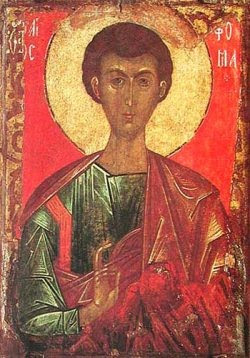Question:
Why is a special Sunday dedicated to the Apostle Thomas?
Answer:
Belief in the great miracle of the Resurrection did not come to the disciples at once.
The first witnesses were the Myrrh-Bearing Women. It was still dark when they came to the cave in the garden of Joseph of Arimathea. The stone that had closed the entrance to the tomb turned out to have been rolled away. While they were at a loss, an Angel appeared to them and said: Fear not ye: for I know that ye seek Jesus, which was crucified. He is not here: for He is risen, as He said: come, see the place where the Lord lay (Mt 28:5-6). For them to believe, the empty tomb and the word of the Angel were enough. Their caring and loving hearts were not touched by doubt. When they ran to tell the disciples, Jesus Himself met them and said: All hail. And they came and held Him by the feet, and worshipped Him (Mt 28:9). The Apostles did not believe them (Mk 16:11).
On the same day, when evening was drawing near, Jesus revealed the great mystery of His Resurrection to two more disciples (the Apostles of the Seventy, Luke and Cleopas), going to Emmaus, at a distance of sixty stadia (11.5 km) from Jerusalem. For their faith in the Resurrection of their Master, Jesus quoted from the Scriptures all the Messianic prophecy (Lk 24:27). However, they fully believed only after the Mystery of the Eucharist: As He sat at meat with them, He took bread, and blessed it, and broke, and gave to them. And their eyes were opened, and they knew Him, and He vanished out of their sight (Lk 24:30-31). Luke and Cleopas on the same day returned to Jerusalem and told the Apostles, but they did not believe them, as with the Myrrh-bearers. Late in the evening, Jesus appeared to the Apostles, who had gathered behind locked doors out of fear of the Jews. The Savior passed through the locked door. This showed the peculiarity of the Lord’s body, transfigured after the Resurrection. It does not follow the laws of the physical world. Jesus could pass through solid objects. The disciples were seized by confusion, because they thought that they were seeing a spirit. He showed unto them His hands and His side (Jn 20:20). This was important not only to convince them that He had come to them physically, but in order to conquer their disbelief. The Lord gave them to feel His hands, feet, and side. The wounds from the nails convinced them that this is the same body which had been crucified on the Cross.
The event to which Antipascha is devoted took place on the eighth day after the Resurrection. The Apostle Thomas was absent from the first appearance of the Savior to His disciples. Apparently it was not in town. The Apostles who met Thomas joyfully announced the Resurrection of their Teacher. We can assume that they said that Jesus gave them to touch His hands, feet, and sides to touch. Therefore his desire is understandable: Except I shall see in His hands the print of the nails, and put my fingers into the print of the nails, and thrust my hand and His side, I will not believe (Jn 20:25). The disbelief of Apostle Thomas has nothing to do with the hardened immunity to the miracle of the Resurrection that we see among the Jewish leaders. This was the quite natural desire to reaffirm faith by visible and obvious evidence. The Risen Jesus on the eighth day renewed for His Apostles His appearance, appearing before them in the front room, the door of which was shut. To the doubt of the Apostle Thomas, the Savior answers with his own words, exactly repeating the request that Thomas expressed. This could not but amaze the doubting disciple: Reach hither thy finger, and behold my hands, and reach hither thy hand, and thrust it in my side (Jn 20:27). It is namely for this reason, most likely, that Thomas did not fulfill the invitation of his Teacher to touch Him hands, feet, and side, but immediately believed and confessed Jesus Christ as God: My Lord and my God (Jn 20:28). People who stubbornly deny the Divine Savior of the world, bypass this place in the Gospel.
The first week after Pascha is called New week or Antipascha week (the Greek word "anti" means "instead of"), i.e., a renewal of Pascha. On this Sunday, by His new revelation to all eleven of the Apostles, the Lord repeated and renewed the revelation made on the first day of the Resurrection. But since the renewal of the Lord’s revelation took place on behalf of Thomas, the eighth day after Pascha is called St Thomas Sunday. Immediately following the week of Pascha, it completes the most solemn part of the great feast. Therefore Thomas Sunday is sometimes called the eighth day of Pascha. St. Gregory the Theologian writes: “From ancient times and for a good end has been established the law to honor the day of renewal, or better put, on the day of renewal to offer new thanksgiving. For was not the day of renewal the first day of the Resurrection, following from the sacred and luminous night? Why do we give such a name to this present day? That was a day of salvation, and this day of one of the remembrance of salvation" (Homily 44 on New Week.)
Monday, April 12, 2010
Why Thomas Sunday?
Subscribe to:
Post Comments (Atom)










No comments:
Post a Comment